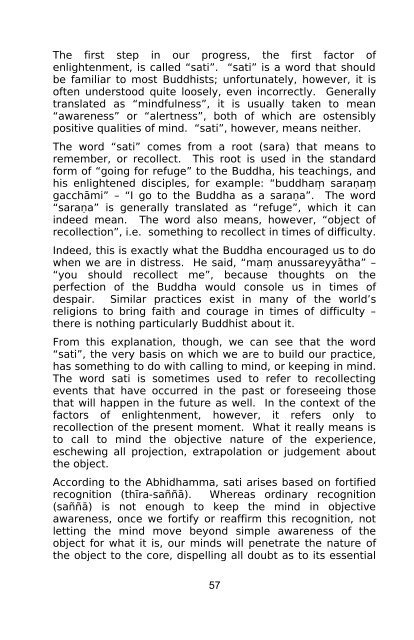Lessons In Practical Buddhism - Sirimangalo.Org
Lessons In Practical Buddhism - Sirimangalo.Org
Lessons In Practical Buddhism - Sirimangalo.Org
Create successful ePaper yourself
Turn your PDF publications into a flip-book with our unique Google optimized e-Paper software.
The first step in our progress, the first factor of<br />
enlightenment, is called “sati”. “sati” is a word that should<br />
be familiar to most Buddhists; unfortunately, however, it is<br />
often understood quite loosely, even incorrectly. Generally<br />
translated as “mindfulness”, it is usually taken to mean<br />
“awareness” or “alertness”, both of which are ostensibly<br />
positive qualities of mind. “sati”, however, means neither.<br />
The word “sati” comes from a root (sara) that means to<br />
remember, or recollect. This root is used in the standard<br />
form of “going for refuge” to the Buddha, his teachings, and<br />
his enlightened disciples, for example: “buddhaṃ saraṇaṃ<br />
gacchāmi” – “I go to the Buddha as a saraṇa”. The word<br />
“saraṇa” is generally translated as “refuge”, which it can<br />
indeed mean. The word also means, however, “object of<br />
recollection”, i.e. something to recollect in times of difficulty.<br />
<strong>In</strong>deed, this is exactly what the Buddha encouraged us to do<br />
when we are in distress. He said, “maṃ anussareyyātha” –<br />
“you should recollect me”, because thoughts on the<br />
perfection of the Buddha would console us in times of<br />
despair. Similar practices exist in many of the world’s<br />
religions to bring faith and courage in times of difficulty –<br />
there is nothing particularly Buddhist about it.<br />
From this explanation, though, we can see that the word<br />
“sati”, the very basis on which we are to build our practice,<br />
has something to do with calling to mind, or keeping in mind.<br />
The word sati is sometimes used to refer to recollecting<br />
events that have occurred in the past or foreseeing those<br />
that will happen in the future as well. <strong>In</strong> the context of the<br />
factors of enlightenment, however, it refers only to<br />
recollection of the present moment. What it really means is<br />
to call to mind the objective nature of the experience,<br />
eschewing all projection, extrapolation or judgement about<br />
the object.<br />
According to the Abhidhamma, sati arises based on fortified<br />
recognition (thīra-saññā). Whereas ordinary recognition<br />
(saññā) is not enough to keep the mind in objective<br />
awareness, once we fortify or reaffirm this recognition, not<br />
letting the mind move beyond simple awareness of the<br />
object for what it is, our minds will penetrate the nature of<br />
the object to the core, dispelling all doubt as to its essential<br />
57












